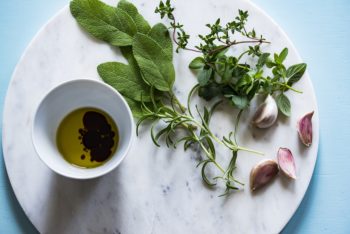Ever wondered why pizza tastes better in Italy – and no, it’s not just because of the scenery! Italian food is based around the freshest of herbs, and no self-respecting mamma would dare cook up a feast using anything that wasn’t sourced straight from the garden or, at the very least, the morning market. Now you can get that same freshness by growing your own pizza herbs at home. Give your garden an extra twist by growing it in the shape of a pizza with the different herbs occupying their own wedges!

The 4 essentials
Rosemary, thyme, oregano and basil are the bottom line where pizzas flavours are concerned. Although these herbs are sun-lovers (aren’t we all!), they are not difficult to grow once you are familiar with their individual preferences.
Rosemary and thyme
These fragrant plants demand very well-drained soil and won’t thrive if their feet are wet. In fact, both rosemary and thyme are so tolerant of poor (nutrient deficient) dry ground that they’ll happily occupy a spot on a sunny clay bank. Plant the prostrate form of rosemary and you’ll find it’s the groundcover of your dreams. Thyme, sourced from a friend, will grow from a piece with a small section of root attached. Simply pop it into a container of coarse potting mix, keep the soil damp until new growth appears and, thereafter, water only when the medium has dried out. Transplant into the garden where, if you don’t have well drained soils, it should be grown on a mound.
Rosemary is a different kettle of fish as rooted pieces are hard to come by. Instead, snip cuttings from an existing plant, strip back a third of the leaves from the lower end, dip the tail of the piece in rooting hormone, and plant it (at an angle) in a container of good quality potting mix. Place 5-6 pieces in a pot and you will find that around 60% of your cuttings grow. Once established (allow 8-12 months for this), transplant your treasures into the garden. Keep your rosemary pruned (if it is of the upright variety) to prevent die back at the centre of the plant.
Oregano
 Used interchangeably with marjoram, oregano is a soft-leafed herb which can be grown from a rooted piece in the same way as thyme. Although it enjoys well drained soil, it also appreciates a modicum of feeding so don’t be afraid to add a little compost to the soil. Because oregano is deciduous (especially in colder parts of the country), pick plenty over summer and dehydrate or air dry it for winter use. Cut back the dead wood in late winter.
Used interchangeably with marjoram, oregano is a soft-leafed herb which can be grown from a rooted piece in the same way as thyme. Although it enjoys well drained soil, it also appreciates a modicum of feeding so don’t be afraid to add a little compost to the soil. Because oregano is deciduous (especially in colder parts of the country), pick plenty over summer and dehydrate or air dry it for winter use. Cut back the dead wood in late winter.
Basil
Unlike the other pizza herbs, basil is an annual so it will need to be sown and grown afresh easch spring. This isn’t an arduous task providing you remember one important rule: basil detests too much moisture. Once the seed has germinated, water moderately. When the seedlings have developed their first true leaves, hold back on the water until the soil is dry to the touch. As with oregano, basil can be dried for winter use.
Don’t stop there!
Once your herbs are established, the next challenge is to grow your own pizza sauce – so start preparing your tomato and garlic beds now!








Join the Discussion
Type out your comment here:
You must be logged in to post a comment.